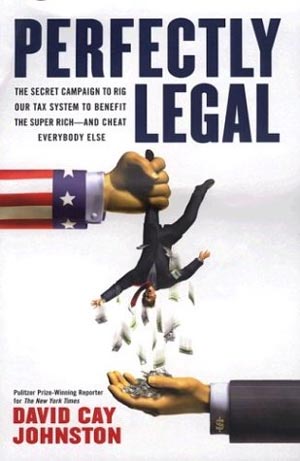
Perfectly
Legal
by
David Cay Johnston
Portfolio / 2003 / $25.95
The
most
important book to be published in the last several years
is not on sex, drugs, or rock 'n' roll, but on taxes.
That's
right: taxes.
David
Cay Johnston knows taxes: He's won one Pulitzer, and been nominated
for several more, for writing about them for the New York Times.
We all know, instinctively, that the system is screwing us, but
Johnston tells us how exactly we're being screwed in clear, comprehensible,
everyday language that anyone can understand.
Taxes,
when you think about it, are inevitable—as explained by Oliver
Wendell Holmes, they are the price we pay to live in a civilized
society. This is a risky proposition to state in an Internet publication:
The latest result of the American penchant for small government
and don't-tread-on-me-ism is a breed of online libertarian who believes
that the world will be perfect if the government would just go away
and leave him alone.
Yet,
the Internet itself could not have come about if not for government
grants; it came out of ARPAnet, a product of the Cold War-era desire
for a decentralized communication system. Modern people are no more
capable of living independently of one another than my finger could
if I sliced it off my hand. American individualism aside, we are
no longer Kit Carsons, living on the edge of the wilderness, wearing
the skins of the animals we shoot for food. No individual or corporation
can afford to, or should be trusted with, the maintaince of roads,
law enforcement, and other such necessary institutions. Like it
or not, from Mesopotamian kings directing the storing of grain against
famine years to our modern Social Security system, all human civilization
is to some degree socialist—and so, taxes are a necessary evil.
More
importantly, in Johnston's view, they are a way to examine our entire
economy. Perfectly Legal makes it clear that our supposedly
meritocratic, equal system is nothing of the sort. To read Johnston's
book is to be outraged. It is immediately apparent that there are
two castes in our country: Those of us who labor for wages, and
those well-off individuals who live off a pool of assets. Moreover,
from trust funds to offshore banks, corporations and the superrich
have ways of hiding their income that are not open to us. Nor are
they satisfied with what they have: The pressure to artificially
inflate stock prices by doing more with less is what is driving
the Wal-Martization of our economy. (It has also resulted in my
being laid
off two Christmases in a row.) The losers are employees,
small stockholders, and taxpayers who are unwittingly bankrolling
the personal use of company jets.
The Bush
administration has compounded all this by granting its corporate
allies policy advisor status. The supposed promises of "tax
relief" and $300 checks are lies and propaganda of the rankest
sort. Literally billions of dollars of tax breaks are given to the
wealthy and the corporations. Thus, our mounting budget deficit
and the burden of taxes being shifted onto the middle- and lower-class.
Johnston's anger at this fact is palpable and, after reading this
book, yours will be, too.
Interestingly,
Johnston does not blame the faceless government bureaucracy for
the mess, as most of us would be wont to do. Soviet Russia had a
most clear and fair system of laws; it was the administration that
was corrupt. The American bureaucracy, for all of our complaints
of the IRS, is, for the most part, fairly administered (though incidents
where laws are not equally applied to the rich and powerful do not
escape Johnston's examination). It is our tax code, passed by our
elected representatives, that is Byzantine. Reform must begin with
the tax code, and continue until all Americans (and corporations
doing business in America) are paying their fair share of the burden.
With the billions that have escaped the system, we could easily
afford the social benefits that other countries take for granted
-- health care, a decent education, and retirement benefits.
Lest
anyone forget, 2004 is an election year. I, for one, would like
to see candidates asked some of the questions that David Cay Johnston
raises in Perfectly Legal.